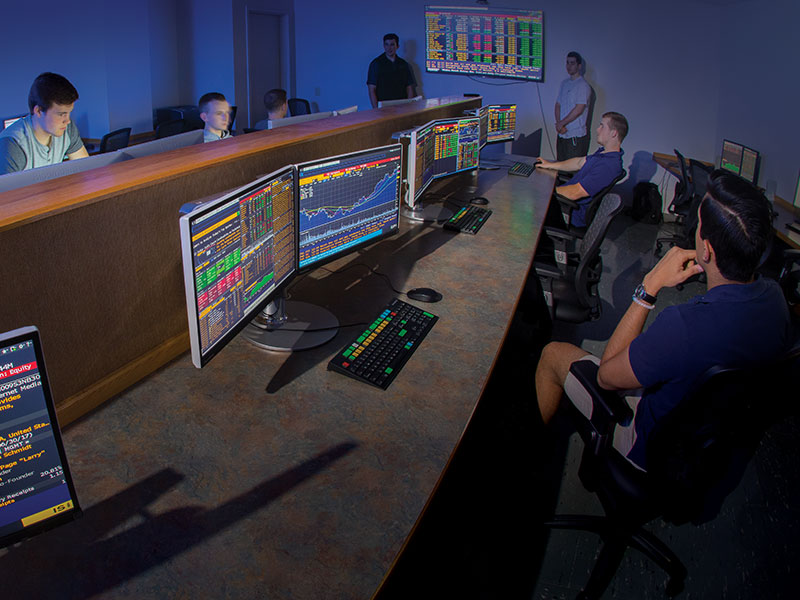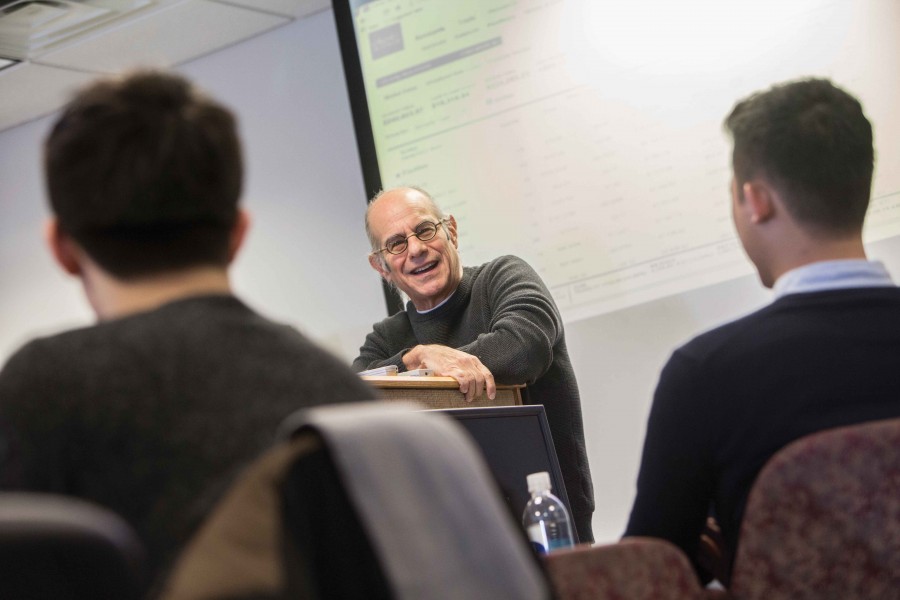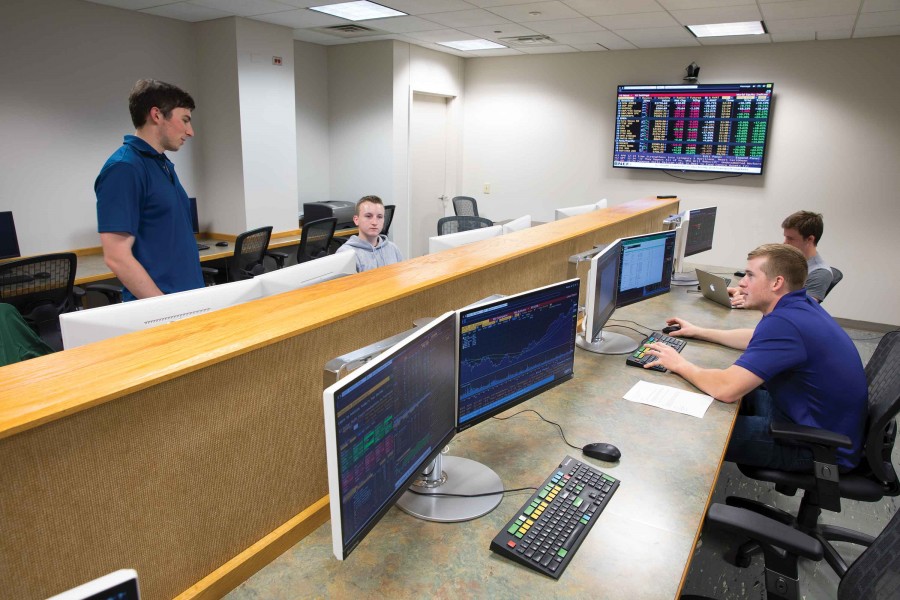Real stakes add urgency to business education
Real-money investment fund mirrors professional work

The finance industry can be fiercely competitive to break into. Entry-level analysts work long hours and are expected stay up to date on market trends around the clock. That’s why a Binghamton University School of Management (SOM) student organization is exposing undergraduates to real money, and what it’s like to work in front-line positions — even before they take finance courses.
The Binghamton University Zurack Trading Room and Investment Fund program prepares newly minted graduates for Wall Street by allowing them to manage a real-money investment portfolio as students. The Investment Fund program, evolved from a four-credit course, allows students to oversee a portfolio of more than $290,000 at the time this article was written. According to Associate Professor Dennis Lasser, each team of student analysts covers one of 10 industries that model the S&P 500 sectors (the American stock market index), including consumer discretionary, healthcare and telecommunications.
“I noticed the members of the Finance Society (a student organization) were participating in case competitions and stock pitches, and they weren’t doing it for any credit,” says Lasser, who is director of the Investment Fund. “These students were so excited and so motivated about their activities outside of class. I asked myself, ‘If we gave them a chance to work with real money and real stocks, how could they not be driven?’”
The Investment Fund became a non-credit experiential learning endeavor in fall 2016. There are 10 senior analysts (juniors and seniors with finance internship experience) who oversee a team of junior analysts (two to three underclassmen per sector) for the 2017-18 academic year.
“We wanted to find a way to teach our students what it really means to work in finance before they start pursuing internships or jobs in finance,” Dean Upinder Dhillon says.
Robert Pim and Ronnie Sanon, both ‘17, wanted to come up with new ways to engage and mentor younger peers interested in finance. They were enrolled in the equity valuation class last spring, when students had the opportunity to manage real money as part of their coursework.
“As equity valuation is an upper-level class, Ronnie and I talked about how there must be ways to get more freshmen and sophomores exposed to this kind of invaluable, real-world experience,” Pim says. “We pitched the idea to Dean Dhillon to transform the class into the Binghamton University Investment Fund, which would allow students of all ages to get involved.”
The experiential learning opportunity evolved from the equity valuation class (instructed by Lasser), which originally received a $100,000 gift in 2003 to establish the fund and help students get more practical experience. The portfolio keeps growing, through donor support ($6,000) and successful stock investments.
Pim, an investment banking analyst at J.P. Morgan, says the Investment Fund program teaches undergraduates unparalleled communication, analytical and presentation skills.
“Upperclassmen teach underclassmen how to perform investment research and company valuation. The goal is to turn a freshman with no finance experience into a student capable of digging into investment ideas and doing research on his or her own,” Pim says. “Having the opportunity to invest $12,000 in a stock that you have conviction in, and having to prove to your peers that it’s a good investment idea, is an eye-opening experience.”
Nicole Lalezarzadeh, a junior majoring in business administration, says the senior analysts have taught her everything from email etiquette to finance lingo to stock market analysis.
“Before I joined the Investment Fund as a sophomore, I told a member of the Finance Society, ‘I’m really interested in this kind of career, but I have no idea what I’m doing’,” she says. “The finance world is full of jargon and technical concepts that are intended to confuse people. Having support from upperclassmen who have done their research and gone through finance courses has been pivotal to my growth and future success.”
Brandon Hohenberg ’17 says the Finance Society offers a recruitment pipeline, but runs as a separate entity from the Investment Fund program.
“Our goal was to make this a unique experiential learning opportunity for all students involved. As a senior analyst, I wanted to teach underclassmen some of the skills and knowledge I wish had as a freshman,” says Hohenberg, who is an incoming finance analyst at Facebook. “I also learned how to be a better mentor and oversee a team.”
All teammates are responsible for being up to date on the movements and trends within their sector. The teams conduct fundamental equity research to pitch new investment ideas and the coverage of current stock holdings. The analysts present their research to other members of the Investment Fund every week.
“Since you don’t start the intensive finance coursework until the beginning of your junior year, the Investment Fund fosters some of the critical skills you will need in your advanced classes and internships,” Hohenberg says. “Essentially, you’re analyzing different stocks in the stock market to see which will most greatly benefit the Investment Fund.”
Lalezarzadeh says the Investment Fund program and experiential learning at Binghamton has made her more confident in the trading room.
“The trading room can be an intimidating space. But you have to be willing to take that first step out of your comfort zone and you’ll soon discover there are so many people willing to help you,” she says. “Binghamton is undergoing a transformation, and the name is being increasingly recognized on Wall Street. Having these kind of experiences and making these connections here will help me succeed in this competitive industry.”


